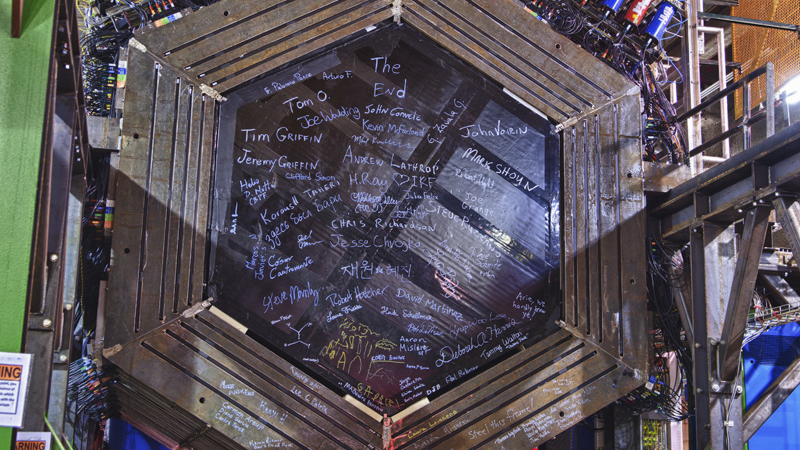MINERvA
Welcome to our MINERvA Warwick page! MINERvA, short for Main INjector ExpeRiment for v-A, is a fascinating experiment at Fermilab. It's all about studying how tiny particles called neutrinos interact with the nuclei of atoms, especially in the energy range known as GeV.
Academics: Dr Steve Boyd, Dr Xianguo Lu
Students: Mr Komninos-John Plows
The MINERvA collaboration celebrated the completion of the neutrino detector’s construction in 2010 by signing the last plane installed. Photo: Reidar Hahn
What We're Discovering
Our goal is to understand the dance between two branches of physics—hadronic and nuclear—and to measure what's going on inside atomic nuclei. This knowledge is crucial for understanding neutrinos and will help with future experiments involving these elusive particles.
Interesting Findings
We've been busy analysing data, and our results show that neutrino interactions are quite complex. This challenges a lot of the ideas scientists had before.
MINERvA has looked closely at data from low-energy neutrinos, where the energy peaks around 3 GeV (that's a measure of energy in physics), with most of the action happening between 1-6 GeV (see review article). We've also wrapped up a phase using medium-energy neutrinos, peaking at 6 GeV. In this phase, we received a whopping 12×1020 protons on target (that's a lot!) in both neutrino and antineutrino modes. This allows us to measure neutrino interactions with unprecedented precision.
UK Team Contribution
Our MINERvA team in the UK started in Oxford in 2016 and expanded to Warwick in 2021. We're proud to lead in the measurement of something called transverse kinematic imbalance (TKI) in neutrino-nucleus interactions. Some highlights of our work are explained in articles like Phys. Rev. D 102, 072007 (2020), Phys. Rev. D 101, 092001 (2020), and Phys. Rev. Lett. 121, 022504 (2018).
Meet Dr. Xianguo Lu
Dr. Lu coordinated the analysis for working groups and the collaboration from 2018 to 2023 and was part of several committees. His understanding extends to exclusive neutrino interactions, with his notable contribution being the creation of TKI, along with expertise in data analysis.
Feel free to reach out if you have any questions!

